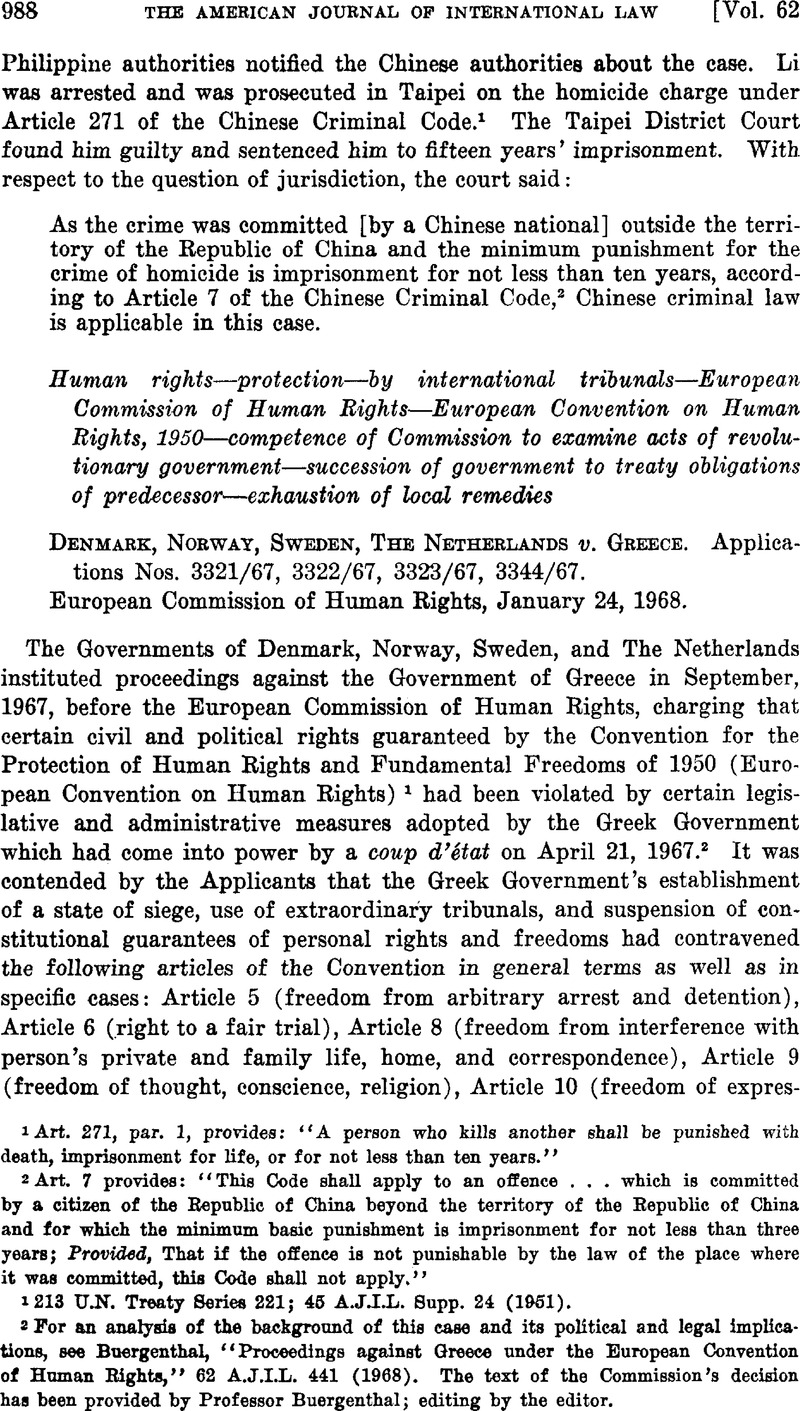No CrossRef data available.
Article contents
Human rights—protection—by international tribunals—European Commission of Human Bights—European Convention on Human Rights, 1950—competence of Commission to examine acts of revolutionary government—succession of government to treaty obligations of predecessor—exhaustion of local remedies
Published online by Cambridge University Press: 28 March 2017
Abstract

- Type
- Judicial Decisions
- Information
- Copyright
- Copyright © American Society of International Law 1968
References
* Reported and translated into English by Dr. Hungdah Chiu, Research Associate, Harvard Law School.
1 213 TLN. Treaty Series 221; 45 A.JJ.L. Supp. 24 (1951).
2 For an analysis of the background of this case and its political and legal implications, see Buergenthal, “Proceedings against Greece under the European Convention of Human Eights,” 62 A.J.I.L. 441 (1968). The text of the Commission's decision has been provided by Professor Buergenthal; editing by the editor.
3 Art. 24 provides: “Any High Contracting Party may refer to the Commission, through the Secretary-General of the Council of Europe, any alleged breach of the provisions of the Convention by another High Contracting Party.“
4 Council of Europe, European Commission of Human Rights, Decision of the Commission 15.
5 Art. 15 provides: “ (1) In time of war or other public emergency threatening the life of the nation any High Contracting Party may take measures derogating from its obligations under this Convention to the extent strictly required by the exigencies of the situation, provided that such measures are not inconsistent with its other obligations under international law. ” ( 2 ) No derogation from Article 2, except in respect of deaths resulting from lawful acts of war, or from Articles 3, 4 (paragraph 1) and 7 shall be made under this provision. ” ( 3 ) Any High Contracting Party availing itself of this right of derogation Bhall keep the Secretary-General of the Council of Europe fully informed of the measures which it has taken and the reasons therefor. It shall also inform the Secretary-General of the Council of Europe when such measures have ceased to operate and the provisions of the Convention are again being fully executed.“
6 Decision of the Commission 18.
7 Art. 19 provides: “To ensure the observance of the engagements undertaken by the High Contracting Parties in the present Convention, there shall be set up— ” (1) A European Commission of Human Eights, hereinafter referred to as ‘the Commission'; ” ( 2 ) A European Court of Human Eights, hereinafter referred to as ‘the Court.’ “ Art. 25 provides: “(1) The Commission may receive petitions addressed to the Secretary-General of the Council of Europe from any person, non-governmental organisation or group of individuals claiming to be the victim of a violation by one of the High Contracting Parties of the rights set forth in this Convention, provided that the High Contracting Party against which the complaint has been lodged has declared that it recognises the competence of the Commission to receive such petitions. Those of the High Contracting Parties who have made such a declaration undertake riot to hinder in any way the effective exercise of this right. ” ( 2 ) Such declarations may be made for a specific period. ” ( 3 ) The declarations shall be deposited with the Secretary-General of the Council of Europe who shall transmit copies thereof to the High Contracting Parties and publish them. ” ( 4 ) The Commission shall only exercise the powers provided for in this Article when at least six High Contracting Parties are bound by declarations made in accordance with the preceding paragraphs.“
8 56 A.J.I.L. 171 (1962).
9 Art. 26 provides: “The Commission may only deal with the matter after all domestic remedies have been exhausted, according to the generally recognised rules of international law, and within a period of six months from the date on which the final decision was taken.“
10 Art. 27 provides: “ (1) The Commission shall not deal with any petition submitted under Article 25 which— (a) is anonymous, or (b) is substantially the same as a matter which has already been examined by the Commission or has already been submitted to another procedure of international investigation or settlement and if it contains no relevant new information. ” ( 2 ) The Commission shall consider inadmissible any petition submitted under Article 25 which it considers incompatible with the provisions of the present Convention, manifestly ill-founded, or an abuse of the right of petition. ” ( 3 ) The Commission shall reject any petition referred to it which it considers inadmissible under Article 26.“
11 Decision of the Commission 22-24.


